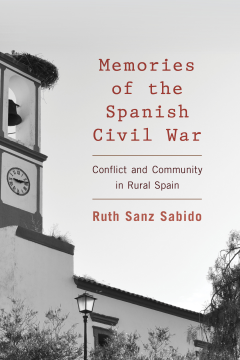
Additional Information
Book Details
Abstract
The Spanish Civil War left a legacy of destruction, resentment and deep ideological divisions in a country that was attempting to recover from economic stagnation and social inequality. After Franco’s victory, the repression and purge that ensued immersed Spain in a spiral of fear and silence which continued long after the dictator’s death, through ‘the pact of oblivion’ that was observed during the transition to democracy.
Memories of the Spanish Civil War: Conflict and Community in Rural Spain attempts to break this silence by recovering the local memories of survivors of the Civil War and the early years of Franco’s dictatorship. Combining oral testimony gathered in one Andalusian village, with archival research, this ethnographic study approaches the expression of memory as an important site of socio-political struggle.
In this reflective oral history enquiry into the popular memory of the civil war in Spain, Ruth Sanz Sabido offers us pertinent and fascinating insights into the now disappearing world of village Spain, where the war is still being fought over. But as her study reminds us, this war is not so much the one actually waged in the late 1930s, as the one made and embedded discursively afterwards by the victorious and long-lived Franco dictatorship, a regime whose cultural and social power has lasted into the present day. This theoretically literate but still highly accessible account opens up for us the granular texture of local life and language, while also providing the crucial broad explanatory context to the memory wars raging in Spain today.
Helen Graham, Professor of Spanish History at Royal Holloway, University of London
With thousands of books published on the Spanish Civil War, Sanz Sabido’s twist is to preserve memories of residents of the small Andalusian village of Arroyomolinos de León to challenge the war’s contemporary legacy. Using memory studies, critical ethnography, and oral history, 22 in-depth interviews capture ordinary people’s recollections of local events to confront the official, state-sponsored construction of public memory about the bloody conflict. Emotionally charged accounts of active and passive resistance give a rural perspective on Franco forces’ repressive acts of accusations, arrests, internments, and executions. Local customs, traditional moral expectations, and close social networks where accusations and personal grudges mix frame the villagers’ memories of day-to-day struggles to survive the wartime atrocities and years of hunger that followed. Sanz Sabido juxtaposes such local memories with Spain’s Amnesty Act of 1977, which effectively silenced official discussions about such contentious issues to assist the post-Franco transition to democracy. The book’s seven chapters advance hope that the Spanish state will eventually recognize the past and acknowledge its failures of historical memory.
In its analysis of oral testimonies, Memories of the Spanish Civil War offers a superb combination of scientific rigour, empathy and sensitivity. By recuperating silenced voices from a community that is marked by the experience of Francoist violence, Ruth Sanz Sabido provides an essential insight into the complexity of individual and collective memory.
Ángela Cenarro, Professor in the Department of Modern and Contemporary History,Universidad de Zaragoza
Ruth Sanz Sabido is Senior Lecturer in Media and Communication at Canterbury Christ Church University, UK.
Ruth Sanz Sabido’s book makes a compelling case for treating Spain’s collective dementia regarding its Civil War by contrasting the experiences of specific people and places with the myths created by the Franco regime and perpetuated by post-Franco governments. Her message comes none too soon. Time is running out for the generations that remember those experiences.
Richard Barker, Spanish Professor Emeritus, University of Wisconsin-Stevens Point
The value of the oral testimonies Ruth Sanz Sabido has collected lies in the ways they give us narrative descriptions that have previously been refused or marginalised and create a discursive space for voices hitherto repressed and rendered inarticulate. ... Overall, Sanz Sabido offers an effective counter-mechanism to the silencing of the voices of the defeated. .. This book acts very well as an antidote to what Sanz Sabido calls the institutionalization of oblivion as well as to the myths created by the Franco regime. In countering them, it provides a fine critical analysis of popular memory of the Civil War in Spain.
This book… is a pleasant read and accessible to the general public… It’s very instructive for public historians. It stresses the role of public policy in restricting and promoting certain memories in Spain during the Franco regime up until the arrival of democracy in 1978
Ruth Sanz Sabido recovers the stifled voices of the victims of fascism and excavates the buried trauma of past and present generations in a powerful monograph based on first- and second-hand testimonies of survivors in a small village in southern Spain. [The author] nobly illuminates the dark origins of Spanish fascism in a compelling microcosmic study – one that will hopefully turn the historiography further toward the resurrection of politically interred remembrances and ultimately realign history with veracity.
This book… is a pleasant read and accessible to the general public… It’s very instructive for public historians. It stresses the role of public policy in restricting and promoting certain memories in Spain during the Franco regime up until the arrival of democracy in 1978.
